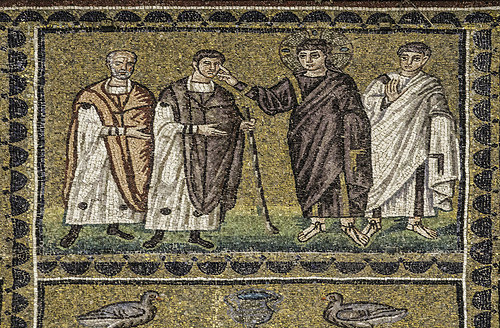We run our website the way we wished the whole internet worked: we provide high quality original content with no ads. We are funded solely by your direct support. Please consider supporting this project.

Does God Still Heal?
In the ancient world Jesus was known first and foremost as an exorcist and a healer. These two activities are mentioned in every summary of Jesus’s ministry found in the Gospels.
It’s common for Western Christians today to accept that infirmities (sickness, disease, injuries, disabilities and deformities) are part of God’s mysterious plan for their life. We may ask God to relieve us and others from physical afflictions, but we also pray for God to help us accept them as part of his mysterious “sovereign plan.”
Jesus and the early church had a different perspective, however. Never once did Jesus or anyone else in the New Testament encourage people to accept their afflictions as coming from God. Instead, they uniformly revolted against afflictions as being the direct or indirect byproducts of Satan’s oppressive regime. They viewed sickness and disease as part of the diabolic curse that afflicts the fallen world and they understood that the kingdom of God is all about reversing the curse. They believed that where God reigns, his original holistic design for the human body would be restored and the physical afflictions that were directly or indirectly brought about by the demonic powers would cease.
For example, Luke describes a woman who was “bent over and could not straighten up at all” as being “crippled by spirit.” When Jesus healed the woman certain religious authorities objected, for it was the Sabbath. But Jesus replied, “should not this woman, a daughter of Abraham, whom Satan has kept down for 18 long years, be set free on the Sabbath day from what bound her?” (Luke 13:11, 16). The woman’s deformed back was the result of a crippling spirit and part of Satan’s oppressive regime.
The central role healing played in Jesus’s ministry as well as the close connection between physical infirmities and demonic activity is succinctly expressed by Peter when he summarizes Jesus’s ministry by saying, “he went around doing good and healing all who were under the power of the devil” (Acts 10:38). Jesus was all about reversing the curse, and this included all forms of physical affliction.
This was the general understanding of the church for the first three centuries. In fact, the early church’s ability to free people from physical afflictions and demonic oppression was one of the strongest tools of evangelism. While healers and exorcists were rather common in the ancient world, it was widely conceded that no one could heal or deliver people as effectively and as consistently as Christians.
Since the job of the church is to manifest everything Jesus manifested and revolt against everything Jesus revolted against, we must accept that manifesting God’s original holistic design for the human body while revolting against the powers that afflict us physically remains a central part of our kingdom mandate. We are called to revolt against physical infirmities as part of Satan’s regime, not accept them as part of God’s mysterious will.
We are called to trust that God can and does continue to heal people today.
Image by Lawrence OP via Flickr
Category: Q&A
Tags: Faith, Sickness, Spiritual Warfare, Warfare Worldview, healing
Topics: Faith & Doubt, The Problem of Evil
Related Reading

The Cross Above All Else
The way to know what a person or people group really believes is not to ask them but to watch them. Christians frequently say, “It’s all about Jesus,” but our actions betray us. Judging by the amount of time, energy, and emotion that many put into fighting a multitude of battles, ranging from the defense…

Terror in the Night
I’ll never forget the night it first happened to me. I was thirteen, sharing a bedroom with my older brother. I woke up in the middle of the night and felt as if something was pinning me to the bed, choking me, and electrocuting me, all at the same time. The wind was blowing through…

The Destiny of God’s People
Jesus represents the realization of God’s glorious dream for humanity. In Christ, we see what we who are in Christ are destined to be. As a stick placed in a river is destined to be carried to whatever body of water the river runs to, so all who have allowed themselves to be drawn by…

Open Theism: A Basic Introduction
On Monday and Tuesday, Greg explained Molinism and contrasted it against the open view of the future. (Click here for part 1). Because many see the open view as a limited view of God, it’s helpful to be clear that this has less to do with the nature of God and is about the nature…

The Universal Experience of the “Spiritual”
Humans have from prehistoric times generally assumed the reality of spirits who transcend our physical existence. Outside of post-Enlightenment western intellectual culture the belief in spirits is almost universal. Whether conceptualized as spirits of nature or as power animals (as in primordial cultures), as helpful malã’ika or malicious Jinn (Islam) or as guardian angels or…

Video Q&A: Do you think Jehovah’s Witnesses and Mormons are saved?
Does Greg believe that everyone goes to Heaven regardless of their beliefs? Find out here.
